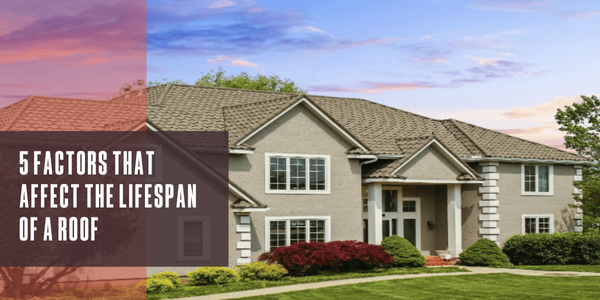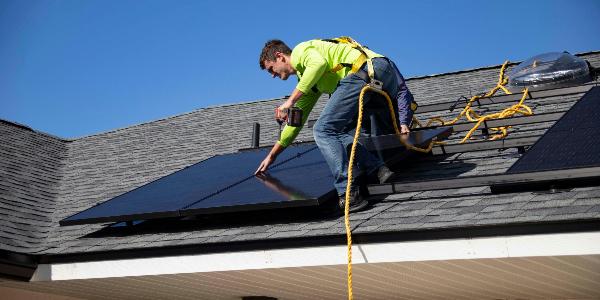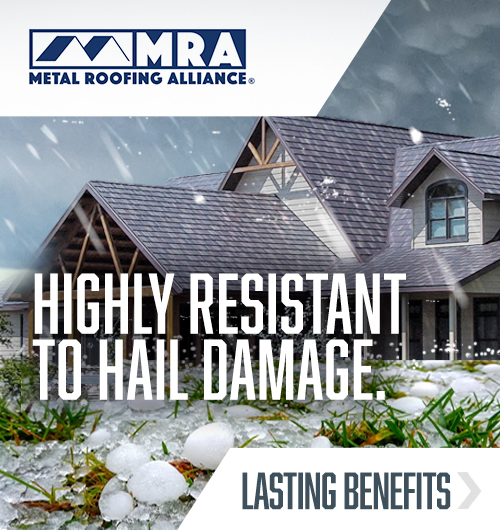5 factors that affect a roof’s lifespan
February 22, 2025 at 6:00 a.m.By Trevor Underwood, DECRA Metal Roofing.
Learn how top roofing materials perform over the years.
Editor’s note: Share this information with your customers who want to learn more about the longevity of their roof.
A roof is a large investment, which means that durability and longevity are key factors when it comes to picking what material to install. But this must also be balanced by other factors, such as financial limitations and aesthetic wants. In this guide, DECRA Metal Roofing breaks down the factors that can affect a roof’s lifespan, such as local climate conditions and installation methods. It also examines common roofing materials and how they stack up against one another.
1 - Climate and weather conditions
One of the most significant factors that can impact how long a roof lasts is the local climate. For example, in areas with harsh sunlight and high temperatures, some roofing materials can crack and degrade over time. Asphalt shingles are particularly vulnerable to this. In colder climates, the cycles of freezing and thawing can affect the roof structure, leading to the formation of ice dams.
In regions prone to high winds or hurricanes, the roof needs to be able to withstand intense pressure. If the roof isn’t up to the task, high winds can lift shingles, tiles or panels, potentially causing severe damage or even complete roof failure.
Heavy rainfall and humidity can also play a role in reducing a roof's lifespan, especially for wood shingles and shakes, as they can lead to rot and mold growth.
2 - Installation
The importance of a proper installation cannot be overstated. Improper flashing, inadequate ventilation or improper sealing of roof components can compromise the integrity of the roof, leading to premature deterioration and reduced lifespan. It's crucial to ensure your roof is installed by experienced professionals. Remember, initial savings from a cheaper, less experienced roofer might end up costing you more in the long run due to frequent repairs or premature replacement.
3 - Maintenance and care
Regular maintenance and proactive care not only extend the life of the roof, but also save homeowners from costly repairs. Homeowners should establish a regular inspection routine to identify and address any issues promptly. Cleaning gutters, removing debris and keeping the roof free from organic matter can prevent moisture buildup and potential damage.
4 - Ventilation and insulation
Proper attic ventilation and insulation contribute significantly to the lifespan of your roof by maintaining a consistent temperature in your attic and helping to prevent damage from extreme weather conditions. For example, poor ventilation can lead to heat buildup, which can cause asphalt shingles to age prematurely. Proper ventilation and insulation are also critical to the overall energy efficiency of the roof.
5 - Roofing material quality
The quality of the roofing material itself is paramount in determining how long it will last, and different roofing materials vary dramatically in their longevity. We’ll do a deep dive into the lifespan of different roofing materials in the next section.
The average life expectancy of popular roofing materials
Asphalt shingles
As the cheapest roofing material on the market, it’s not surprising that asphalt shingles have one of the shortest lifespans. Petroleum-based asphalt shingles need to be replaced every 12 to 20 years and homeowners looking for the longest-lasting roofing material may want to explore other options.
Wood shingles and shakes
The lifespan of wood shake roofing can range from 20 to 40 years, depending on how well the roof is maintained. Regular inspections, cleaning and treatments are often necessary with wood roofs. Without proper care and frequent maintenance, they are susceptible to a host of issues including rot, decay, insect infestations and water damage.
Clay Tile
Clay tile roofs are undeniably beautiful, but they are also inherently fragile. Just walking on a clay tile roof for routine maintenance can cause damage. The fragility of clay tiles requires caution and careful handling to prevent cracks or breakage. Clay tiles are also one of the heaviest and most expensive roofing materials.
[Insert “roofing weight.jpg” between these paragraphs]
The weight of a clay tile roof can pose structural challenges that require additional construction or reinforcement to ensure the roof's integrity and longevity.
Metal roofing
With a lifespan of 40 to 70 years, metal roofs are a long-term investment that can outlast multiple generations of asphalt shingle roofs. One of the primary reasons for the extended lifespan of metal roofs is their durability and resistance to the elements. Metal roofing can withstand severe weather conditions, including high winds, heavy snow loads and hail. They’re highly resistant to corrosion and water damage, which also contributes to their longevity.
FAQs about roof longevity
Q: Will my roof last longer with regular cleaning?
Absolutely. Regular cleaning can significantly extend the life of your roof. Over time, roofs can accumulate debris, moss and algae, which can damage roofing materials. Regular cleaning helps maintain the integrity of the roof, preventing damage and identifying potential problems before they escalate.
Q: How does the slope of my roof affect its longevity?
A roof with a steep slope will typically last longer as it is better at shedding water and snow. Water lingering on a roof can cause damage over time, so a flat or low-slope roof may not last as long as a steeply pitched one. However, the exact impact will also depend on the roofing material and the local climate and weather conditions.
Q: Does the warranty equal the lifespan of the roof?
Not necessarily. While a warranty can provide an estimate of how long a roof might last under ideal conditions, it's not a guarantee. The actual lifespan of a roof can be influenced by many factors, as discussed earlier in this guide. So, while a longer warranty, such as a comprehensive Lifetime Limited Warranty, often indicates a higher-quality and more durable roofing material, it's important not to rely solely on this when estimating how long a roof will last.
Q: Are there any coatings or treatments I can use to extend the lifespan of my roof?
Yes, there are various roof coatings and treatments that can extend the lifespan of different types of roofing materials. For instance, asphalt roofs can benefit from asphalt emulsion coatings that provide extra waterproofing. However, it’s best to consult a professional roofer to ensure that any coating or treatment is suitable for your specific type of roof.
Original article and photo source: DECRA Metal Roofing
Learn more about DECRA Metal Roofing in their Coffee Shop Directory or visit www.DECRA.com.











Comments
Leave a Reply
Have an account? Login to leave a comment!
Sign In